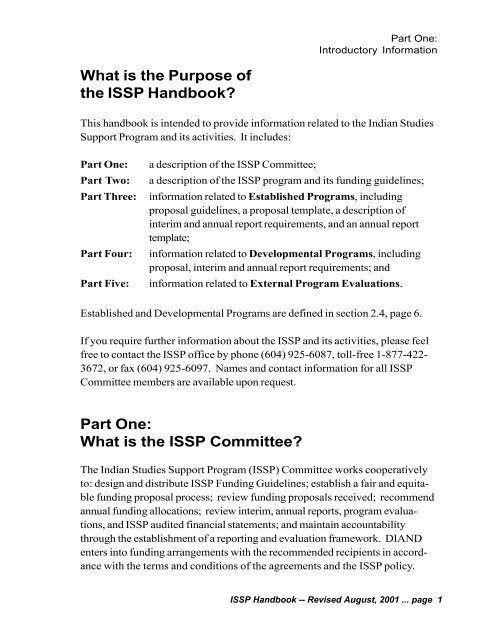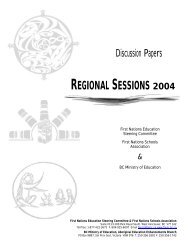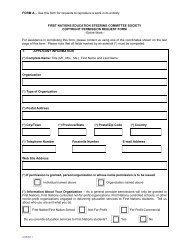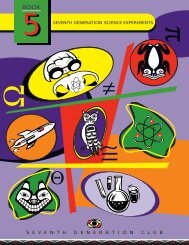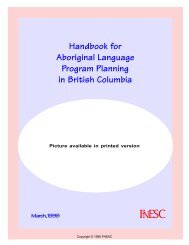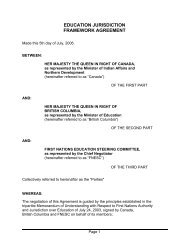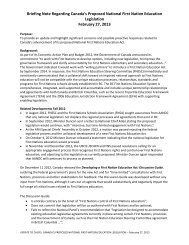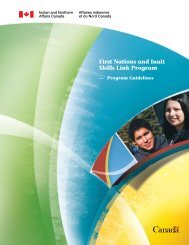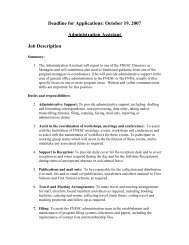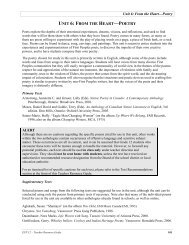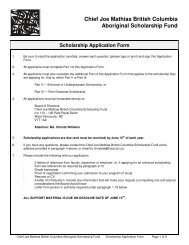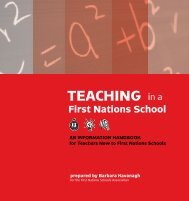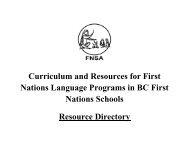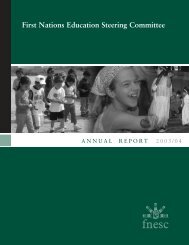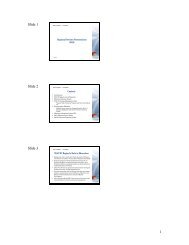ISSP handbook.pdf - FNESC
ISSP handbook.pdf - FNESC
ISSP handbook.pdf - FNESC
Create successful ePaper yourself
Turn your PDF publications into a flip-book with our unique Google optimized e-Paper software.
What is the Purpose of<br />
the <strong>ISSP</strong> Handbook?<br />
This <strong>handbook</strong> is intended to provide information related to the Indian Studies<br />
Support Program and its activities. It includes:<br />
Part One: a description of the <strong>ISSP</strong> Committee;<br />
Part Two: a description of the <strong>ISSP</strong> program and its funding guidelines;<br />
Part Three: information related to Established Programs, including<br />
proposal guidelines, a proposal template, a description of<br />
interim and annual report requirements, and an annual report<br />
template;<br />
Part Four: information related to Developmental Programs, including<br />
proposal, interim and annual report requirements; and<br />
Part Five: information related to External Program Evaluations.<br />
Established and Developmental Programs are defined in section 2.4, page 6.<br />
If you require further information about the <strong>ISSP</strong> and its activities, please feel<br />
free to contact the <strong>ISSP</strong> office by phone (604) 925-6087, toll-free 1-877-422-<br />
3672, or fax (604) 925-6097. Names and contact information for all <strong>ISSP</strong><br />
Committee members are available upon request.<br />
Part One:<br />
What is the <strong>ISSP</strong> Committee?<br />
Part One:<br />
Introductory Information<br />
The Indian Studies Support Program (<strong>ISSP</strong>) Committee works cooperatively<br />
to: design and distribute <strong>ISSP</strong> Funding Guidelines; establish a fair and equitable<br />
funding proposal process; review funding proposals received; recommend<br />
annual funding allocations; review interim, annual reports, program evaluations,<br />
and <strong>ISSP</strong> audited financial statements; and maintain accountability<br />
through the establishment of a reporting and evaluation framework. DIAND<br />
enters into funding arrangements with the recommended recipients in accordance<br />
with the terms and conditions of the agreements and the <strong>ISSP</strong> policy.<br />
<strong>ISSP</strong> Handbook -- Revised August, 2001 ... page 1
The <strong>ISSP</strong> Committee is housed with the First Nations Education Steering Committee.<br />
The Committee also works closely with other First Nations organizations<br />
and institutes, and is committed to sharing information and resources<br />
whenever possible. Terms of Reference for the <strong>ISSP</strong> Committee are available<br />
upon request.<br />
1.1 <strong>ISSP</strong> Committee Mission Statement<br />
The <strong>ISSP</strong> Committee will promote, support and enhance the development and<br />
implementation of post-secondary education programs which are socially and<br />
culturally sensitive in meeting the needs of First Nations people.<br />
1.2 <strong>ISSP</strong> Committee Objectives<br />
The <strong>ISSP</strong> Committee is committed to the following objectives:<br />
Part One:<br />
Introductory Information<br />
1 To promote access to quality First Nations Post-Secondary learning<br />
programs.<br />
2 To encourage the preservation and maintenance of First Nations languages<br />
and cultures.<br />
3 To support and encourage the development of accredited First Nations<br />
post-secondary programs.<br />
4 To encourage First Nations people in the development of economic and<br />
social self-reliance through education and capacity building.<br />
5 To secure consistent funding for external evaluations of programs funded<br />
by <strong>ISSP</strong>.<br />
6 To promote First Nations institutional and community capacity.<br />
<strong>ISSP</strong> Handbook -- Revised August, 2001 ... page 2
Part Two<br />
Guidelines for Proposals<br />
2 . 1 Objectives of <strong>ISSP</strong> Funded Projects<br />
Programs funded by the <strong>ISSP</strong> Committee will:<br />
• be controlled and administered by a First Nations Governance Authority;<br />
• support First Nations post-secondary education;<br />
• increase opportunities for First Nations students to complete post-secondary<br />
programs of study;<br />
• emphasize disciplines relevant to self-reliance and self-government; and<br />
• enhance First Nations languages.<br />
Note: <strong>ISSP</strong> funding is not to be used for curriculum development.<br />
2.2 Eligibility for <strong>ISSP</strong> Funding<br />
Part Two:<br />
General Guidelines<br />
Any First Nations Band, Tribal Council, organization, or First Nations Post-<br />
Secondary Institute located in British Columbia may apply for <strong>ISSP</strong> funding.<br />
To be considered eligible, an applicant for renewed funding must have had<br />
their Annual Report from the previous year approved.<br />
<strong>ISSP</strong> funding is available for accredited post-secondary programs. Accredited<br />
programs lead to a certificate, diploma, or degree that is recognized by a public<br />
institute, college or university. The credits leading to the certificate, diploma,<br />
or degree should be transferable to other academic institutes. Eligible programs<br />
include those that are administered through an affiliation or brokering<br />
agreement (please see definitions on page 6).<br />
<strong>ISSP</strong> funding may also be used for University and College Preparation (UCEP)<br />
Programs. Those programs require that students enrolled have previously<br />
attained a minimum of five (5) one-year courses at the Grade 11 level (or<br />
equivalent). UCEP Programs must provide students with the academic level<br />
required for entrance into regular university or college programs within a tenmonth<br />
period.<br />
<strong>ISSP</strong> Handbook -- Revised August, 2001 ... page 3
Students accessing a UCEP program must not be eligible for DIAND nominal<br />
roll funding. Students accessing a UCEP program must be 19 years of age or<br />
older. UCEP programs must include English 11/12, academic math 11/12, and<br />
sciences, i.e. biology 11/12, physics 11/12, or chemistry 11/12.<br />
2.2.1 Proposal Reviews<br />
Part Two:<br />
General Guidelines<br />
Proposals must meet the criteria described in this <strong>handbook</strong>. Incomplete<br />
proposals will not be considered.<br />
Due to limited <strong>ISSP</strong> funding, not all proposals will<br />
necessarily receive funding. Programs that have<br />
received <strong>ISSP</strong> funding in the past are not guaranteed<br />
continued funding.<br />
<strong>ISSP</strong> Handbook -- Revised August, 2001 ... page 4
2.3 Application Procedures<br />
Proposals between 10 and 15 pages in length should be submitted.<br />
Appendices supporting the proposal may be included, but do not<br />
make up a part of the project description.<br />
Proposals must be received on or before the proposal deadline of<br />
4:30 p.m. January 25th, 2002.<br />
Proposals must be mailed or sent by courier. Faxed proposals will<br />
not be accepted under any circumstances.<br />
Upon receipt, all proposals will be logged in and dated.<br />
A copy of all proposals will be sent to the <strong>ISSP</strong> Committee members<br />
for review.<br />
The Committee will meet in February to assess each proposal in<br />
terms of its fulfillment of the program criteria, and the Committee will<br />
make funding allocation recommendations.<br />
The recommendations of the <strong>ISSP</strong> Committee will be submitted to<br />
the Director of Funding Services, DIAND, who will announce the<br />
decisions of the Committee.<br />
DIAND will manage the funding contribution through the established<br />
funding agreement as per DIAND’s criteria.<br />
Note: for societies, DIAND may flow <strong>ISSP</strong> funding<br />
through a Band or Tribal Council. Therefore, please<br />
indicate the Band or Tribal Council of your preference.<br />
If this is not indicated, DIAND may arbitrarily choose a<br />
flow-through Band or Tribal Council.<br />
DIAND may request an original signed copy of a flowthrough<br />
delegation agreement between the parties.<br />
Submit proposals to: Chair, Indian Studies Support Program<br />
Suite 113 - 100 Park Royal South<br />
West Vancouver, BC<br />
V7T 1A2<br />
Part Two:<br />
General Guidelines<br />
<strong>ISSP</strong> Handbook -- Revised August, 2001 ... page 5
2.4 Definitions and Program Criteria<br />
Part Two:<br />
General Guidelines<br />
Accreditation: an eligible program leads to a certificate, diploma or degree<br />
that is recognized by a public institute, college or university. The credits leading<br />
to the certificate, diploma or degree must be transferable to other academic<br />
institutes.<br />
Affiliation: to be eligible for funding, a First Nations institute may be affiliated<br />
with a public post-secondary institute such that credits earned can be transferred<br />
to comparable programs in other institutes.<br />
Brokered: to be eligible for funding, a First Nation or First Nations institute<br />
may pay a public post-secondary institute a fee for the delivery of an accredited<br />
program.<br />
Core Funding: is an institute’s regular funding that pays for its day-to-day<br />
operations. The <strong>ISSP</strong> cannot contribute core funding. Please see page 19<br />
for budget items that are funded.<br />
Developmental Projects: require more planning or design to ensure completion<br />
to the point of accredited implementation. Examples of developmental<br />
activities include the following: developing affiliation or brokering agreements,<br />
surveying community post-secondary education needs, establishing First Nations<br />
governance authorities, society incorporation, private post-secondary<br />
licensing (please refer to Part 4 of this Handbook for more information related<br />
to development projects).<br />
Established Projects: have been fully developed, are accredited, and have a<br />
functioning Board or Governance Authority.<br />
First Nations Governance Authority: a board elected or selected by and<br />
accountable to the First Nations community(ies) it serves.<br />
<strong>ISSP</strong> Handbook -- Revised August, 2001 ... page 6
Part Two:<br />
General Guidelines<br />
First Nations Post-Secondary Institutes: are established and operated by<br />
First Nations organizations, such as Tribal Councils, Band Councils, education<br />
committees/school boards, and First Nations organizations, specifically for the<br />
purpose of providing post-secondary education to First Nations post-secondary<br />
students.<br />
Full-Time Equivalent (FTE): is one seat per week times four courses in a<br />
program of at least two-semester duration. Specifically, the instructional hours<br />
(including practice) per FTE equals three to four hours per course for a minimum<br />
of 13 weeks per semester times four courses times two semesters. For<br />
example, one student taking four courses, with each course being three hours<br />
long, is a total of 12 credit hours per semester. This student must be enrolled<br />
in two semesters with a total of 24 credit hours to be qualified as one FTE.<br />
Institute Credibility: the proposal should describe the history of the institute,<br />
making particular reference to the institute’s standing -- i.e. First Nations governance<br />
authority, society incorporation, post-secondary license, etc.<br />
<strong>ISSP</strong> Projects: promote economic self-reliance, teach First Nations language<br />
or culture courses, and/or promote First Nations self-government and/or selfreliance.<br />
Reporting: Interim, Annual and External Program Evaluation Reports, if<br />
applicable, must be submitted to the <strong>ISSP</strong> Committee in accordance with<br />
the deadline dates established. No exceptions, no extensions will be considered.<br />
For reporting details, please refer to sections 3, 4, and 5 of the Handbook.<br />
Transfer Credit: those courses for which transfer credit may be granted to<br />
the bearer from one institute to another within or out of BC, (eg. Saskatchewan<br />
Indian Federated College, Gonzaga, Simon Fraser University, etc.).<br />
<strong>ISSP</strong> Handbook -- Revised August, 2001 ... page 7
2.5 Proposal Format<br />
Due to the volume of proposals received by the <strong>ISSP</strong> Committee, it is mandatory<br />
that the <strong>ISSP</strong> proposal format be followed. Failure to follow the <strong>ISSP</strong><br />
format will result in funding ineligibility.<br />
The following sections outline the format for proposals. Please note that the<br />
requirements for Established Programs and for Developmental Projects<br />
differ. The level of detail and amount of information required for proposals<br />
for Established Programs is greater than that required for Developmental<br />
Projects.<br />
Note: submissions for more than one program from the same<br />
institute/organization require a separate proposal for each<br />
program and must be prioritized by the institute/organization.<br />
The remainder of this <strong>handbook</strong> is divided into three sections:<br />
Section Three: Established Programs<br />
Section Four: Developmental Projects<br />
Section Five: External Program Evaluations<br />
Part Two:<br />
General Guidelines<br />
<strong>ISSP</strong> Handbook -- Revised August, 2001 ... page 8
Part Three:<br />
Information for<br />
Established Programs<br />
3.1 Proposal Information<br />
The following information outlines a format for proposals for Established<br />
Programs. All proposals must follow that format.<br />
Note: Incomplete proposals will not be considered. Please<br />
ensure that all of the information outlined in the format is<br />
included in your proposal.<br />
Also available from the <strong>ISSP</strong> Committee is a Guide to Proposal Writing.<br />
That Guide includes suggestions and tips for proposal writing in general.<br />
Some of the ideas included in the Handbook will directly relate to the writing of<br />
an <strong>ISSP</strong> Committee proposal; other suggestions are intended to assist individuals<br />
who are writing proposals for other sources of funding. We hope that<br />
you find the Guide useful.<br />
3.1.1 Proposal Components<br />
Your proposal must include four components.<br />
3.1.2 Covering Letter<br />
Part Three:<br />
Established Programs<br />
A cover letter must be written on letterhead and must be signed by the appropriate<br />
authority(ies). If your organization is submitting more than one<br />
proposal, please indicate in your covering letter which proposal should be<br />
given priority.<br />
<strong>ISSP</strong> Handbook -- Revised August, 2001 ... page 9
3.1.3 Proposal Summary Form<br />
The proposal summary form (please see proposal template attached) must<br />
include the following information:<br />
Name of your organization.<br />
Concise summary of the project (to be described more fully in your written<br />
proposal).<br />
Organizational status and affiliations.<br />
Student statistics.<br />
Signature of authorized representative.<br />
3.1.4 Written Submission<br />
See section 3.2 for a description of the written submission.<br />
3.1.5 Budget<br />
Part Three:<br />
Established Programs<br />
The proposal budget should include all sources of funding, identifying each<br />
source as either confirmed or unconfirmed. If any unconfirmed funding<br />
sources are verified after the proposal has been submitted, please forward a<br />
letter to the <strong>ISSP</strong> Committee stating that the funding has been confirmed.<br />
The <strong>ISSP</strong> does not fund facilities, equipment, program coordination, or curriculum<br />
develpoment. <strong>ISSP</strong> does provide administration fees to a maximum<br />
of 15% of the total project funding.<br />
Note: the <strong>ISSP</strong> Committee cannot provide core funding to<br />
any organization or institute.<br />
<strong>ISSP</strong> Handbook -- Revised August, 2001 ... page 10
3 . 2 Written Proposal Submission<br />
3.2.1 Proposal Title Page<br />
Your title page should include:<br />
Title of the project.<br />
Name and correct address of your organization.<br />
Start and end dates of the project.<br />
Total funds requested.<br />
Name, address, and phone number of a contact person.<br />
Date of submission of your proposal.<br />
3.2.2 ExecutiveSummary<br />
Please include a one-page Executive Summary. That Summary should outline<br />
the project, highlighting the key ideas and objectives.<br />
3.2.3 Table of Contents<br />
Following the Executive Summary, please include a Table of Contents.<br />
3.2.4 Introduction<br />
What is the proposed project about?<br />
Part Three:<br />
Established Programs<br />
In the proposal introduction, briefly indicate the purpose of the project being<br />
proposed, why the project is worthwhile, who it will benefit, and why your<br />
organization is qualified to undertake the project. You may indicate how the<br />
proposed project relates to the <strong>ISSP</strong> funding guidelines and objectives. Also<br />
outline the arrangement of the information to follow, including the proposal<br />
sections.<br />
<strong>ISSP</strong> Handbook -- Revised August, 2001 ... page 11
3.2.5 Statement of Need<br />
Why is the project needed?<br />
In this section, explain the importance of the project being proposed and the need to<br />
which you are responding. Indicate why the need exists, and who it is affecting. Include,<br />
where possible, any available statistics or published information to support your<br />
assertions.<br />
In outlining the reasons for the proposed project, it may be useful to indicate how<br />
long the need has existed, any other attempts to address it, the resources used in<br />
doing so, and the results of those efforts.<br />
3.2.6 Project Goals and Objectives<br />
What will the project achieve?<br />
Clearly indicate the project goals and objectives.<br />
In outlining the project goals, in one or two sentences describe the overall<br />
outcome expected from the project.<br />
In outlining the project objectives, indicate the specific outcomes which are<br />
expected to result from the project.<br />
3.2.7 Methodology<br />
How will the project be implemented?<br />
Describe in detail the activities to take place, how and when the activities will<br />
be carried out, and by whom. This section may include the following subsections:<br />
Introduction<br />
In this section, summarize the proposed approach, emphasizing any of its<br />
innovative or unique aspects.<br />
Program Activities<br />
Part Three:<br />
Established Programs<br />
Explain in some detail the specific activities to be undertaken, as well as why<br />
the activities described are necessary and appropriate.<br />
<strong>ISSP</strong> Handbook -- Revised August, 2001 ... page 12
Supporting Organizations<br />
Identify any groups or organizations which will be participating in the project<br />
implementation, and describe the nature of their participation. Letters to verify<br />
that participation should be attached to the proposal.<br />
Also identify any organizations which support your proposal, and attach to the<br />
proposal supporting letters and documents, such as Band Council Resolutions,<br />
letters from language authorities, etc.<br />
Staffing and Administration<br />
Outline the proposed plan for project administration. This outline should indicate<br />
how many staff members will be directly involved in the administration of<br />
the proposed project, whether those staff members are already employed or<br />
will be hired by your organization to administer the project, and whether they<br />
will be employed on a full-time or part-time basis. Note: funding is provided<br />
only for instruction and support which is directly related to the program.<br />
Funding is not available for project coordination.<br />
Work Plan / Timetable<br />
Include a workplan outlining when each aspect of the project will be<br />
undertaken.<br />
Project Evaluation<br />
Describe your plan for assessing the extent to which the project objectives are<br />
accomplished, including who will be responsible for the project evaluation,<br />
when it will be conducted, and any plans for reporting and using the results of<br />
the evaluation. You may also indicate what kinds of information and data will<br />
be gathered in the evaluation process. An evaluation of your project is required<br />
by the <strong>ISSP</strong> Committee in the form of an Annual Report, described in<br />
detail in this <strong>handbook</strong>.<br />
Outcomes<br />
Indicate the anticipated outcomes of the proposed project.<br />
Part Three:<br />
Established Programs<br />
<strong>ISSP</strong> Handbook -- Revised August, 2001 ... page 13
3.2.8 Organizational Status and<br />
Affiliations with Other Institutions<br />
Describe all existing or pending agreements between your organization and any<br />
other Public or Private Institutions, including:<br />
Accreditation Agreements;<br />
Letters of Agreement;<br />
Affiliation/Brokering Agreements; and/or<br />
Certificate of Incorporation.<br />
Signed copies of those agreements must be attached as appendices to the<br />
proposal.<br />
In addition, attach all documents demonstrating that your organization is in<br />
good standing, such as current licences and/or registration certificates.<br />
3.2.9 Budget Explanation<br />
As described in section 3.1.4, a budget should be attached to the proposal. If<br />
any explanation of the budget is required, include information explaining<br />
budget items and their necessity.<br />
** funding is not available for:<br />
Part Three:<br />
Established Programs<br />
student tuition, student books and supplies, student travel,<br />
student daycare, core funding, curriculum development,<br />
program coordinator/administrator salaries, governance authority<br />
stipends or per diems.<br />
<strong>ISSP</strong> Handbook -- Revised August, 2001 ... page 14
Section 3.3<br />
Proposal Template for<br />
EstablishedPrograms<br />
Part Three:<br />
Established Programs<br />
<strong>ISSP</strong> Handbook -- Revised August, 2001 ... page 15
<strong>ISSP</strong> Proposal Template<br />
Project Title<br />
A Proposal Submitted by:<br />
Your Organization’s Name<br />
Address<br />
Phone and Fax Number<br />
Contact Name<br />
Project to Begin: __________<br />
Project to End: __________<br />
Total Funds Requested: __________<br />
Submitted to:<br />
The Indian Studies Support Program<br />
Chair<br />
Suite 113 - 100 Park Royal South<br />
West Vancouver, BC<br />
V7T 1A2<br />
Date of Submission<br />
Part Three:<br />
Established Programs<br />
<strong>ISSP</strong> Handbook -- Revised August, 2001 ... page 16
<strong>ISSP</strong> Proposal Template<br />
<strong>ISSP</strong> Proposal Summary Form<br />
Proposal Title: ________________________________________________<br />
Type of Program: New _____ Continuing _____<br />
Institution Name: ________________________________________________<br />
Brief Description of Proposal:<br />
Note: the following section of the proposal summary form<br />
applies to continuing programs only.<br />
Current Status of Applicant:<br />
First Nations Controlled: Society ____ Band ____ Tribal Council ____<br />
First Nations Post-Secondary Institute _____<br />
Current Status of Program:<br />
Brokered ____ Accredited ____ Affiliated ____<br />
Part Three:<br />
Established Programs<br />
Current Accreditation:<br />
Institutional affiliation (name) ________________________________________<br />
Course transferability (how and where) ____________________________________<br />
Certificate __________________________________________________________<br />
Diploma ___________________________________________________________<br />
University Transfer Credit ______________________________________________<br />
Degree ____________________________________________________________<br />
Masters Degree _____________________________________________________<br />
Other (specify) _____________________________________________________<br />
<strong>ISSP</strong> Handbook -- Revised August, 2001 ... page 17
<strong>ISSP</strong> Proposal Template<br />
<strong>ISSP</strong> Proposal Summary Form continued<br />
Length of Time Program Has Been in Operation: _______________________<br />
Program Enrolment:<br />
# of full-time students __________ # of part-time students __________<br />
Institutional FTEs __________<br />
Program start and end dates Start ___________ End __________<br />
Student Status: From B.C. Out-of- Out-of<br />
Province Country<br />
# of First Nations Students ________ __________ __________<br />
# of Metis / Non-Status Students ________ __________ __________<br />
# of Non First Nations Students ________ __________ __________<br />
Past Student Success Rates:<br />
program graduation rate * __________<br />
program retention rate ** __________<br />
course completion rate *** __________<br />
Signature of Authorized Representative: ___________________________________<br />
Definitions<br />
Part Three:<br />
Established Programs<br />
* program graduation rate: the graduation rate refers to the number of students who successfully<br />
complete a program, leaving with the appropriate degree, diploma or certificate.<br />
** program retention rate: retention rate refers to the number of students still in progress.<br />
*** course completion rate: course completion rate refers to the number of students who<br />
have completed courses.<br />
<strong>ISSP</strong> Handbook -- Revised August, 2001 ... page 18
<strong>ISSP</strong> Proposal Template<br />
Summary of Funding Request<br />
Amount Required for Program: $ _________________________<br />
Amount Requested from <strong>ISSP</strong> $ _________________________<br />
Cost per FTE $ _________________________<br />
Budget Item<br />
Salaries<br />
- instructors<br />
- Elders/guest speakers<br />
Instructor Travel<br />
Instructor Materials<br />
Instructor Books<br />
and Supplies<br />
Counselling<br />
Tutoring<br />
Overhead<br />
(15% maximum)<br />
Total<br />
Total Amount<br />
Required<br />
Amount Requested<br />
from <strong>ISSP</strong><br />
Part Three:<br />
Established Programs<br />
Amount Funded by<br />
Other Source(s)<br />
* include estimated<br />
tuition fees<br />
Note: all budget items must be directly related to the proposed project delivery.<br />
<strong>ISSP</strong> Handbook -- Revised August, 2001 ... page 19
<strong>ISSP</strong> Proposal Template<br />
Executive Summary<br />
* summarize your proposal in one page.<br />
Part Three:<br />
Established Programs<br />
<strong>ISSP</strong> Handbook -- Revised August, 2001 ... page 20
<strong>ISSP</strong> Proposal Template<br />
Table of Contents<br />
* list proposal sections and sub-sections.<br />
Part Three:<br />
Established Programs<br />
<strong>ISSP</strong> Handbook -- Revised August, 2001 ... page 21
<strong>ISSP</strong> Proposal Template<br />
Introduction<br />
Statement of Need<br />
* describe the project purpose and benefits.<br />
Part Three:<br />
Established Programs<br />
* describe the project’s importance and the need it addresses.<br />
<strong>ISSP</strong> Handbook -- Revised August, 2001 ... page 22
<strong>ISSP</strong> Proposal Template<br />
Program Goals and Objectives<br />
* describe the project’s general and specific outcomes.<br />
Part Three:<br />
Established Programs<br />
<strong>ISSP</strong> Handbook -- Revised August, 2001 ... page 23
<strong>ISSP</strong> Proposal Template<br />
Program Methodology<br />
* describe the program implementation and<br />
approach to be taken.<br />
Part Three:<br />
Established Programs<br />
<strong>ISSP</strong> Handbook -- Revised August, 2001 ... page 24
<strong>ISSP</strong> Proposal Template<br />
Program Activities<br />
* describe the activities to be undertaken.<br />
Part Three:<br />
Established Programs<br />
<strong>ISSP</strong> Handbook -- Revised August, 2001 ... page 25
<strong>ISSP</strong> Proposal Template<br />
Supporting Organizations<br />
* describe supporting organizations.<br />
Staffing and Administration<br />
* describe plans for administering the project.<br />
Part Three:<br />
Established Programs<br />
<strong>ISSP</strong> Handbook -- Revised August, 2001 ... page 26
<strong>ISSP</strong> Proposal Template<br />
Plans for Program Evaluation<br />
Outcomes<br />
* describe the plans for and timing of the program’s evaluation<br />
* describe the expected outcomes.<br />
Part Three:<br />
Established Programs<br />
<strong>ISSP</strong> Handbook -- Revised August, 2001 ... page 27
<strong>ISSP</strong> Proposal Template<br />
Affiliations with Other Institutions<br />
* describe affiliation or brokering agreements and licences and certificates;<br />
attach signed copies.<br />
Budget Explanation<br />
* if applicable, explain budget items.<br />
Part Three:<br />
Established Programs<br />
<strong>ISSP</strong> Handbook -- Revised August, 2001 ... page 28
<strong>ISSP</strong> Proposal Template<br />
Program Workplan<br />
Part Three:<br />
Established Programs<br />
<strong>ISSP</strong> Handbook -- Revised August, 2001 ... page 29
<strong>ISSP</strong> Proposal Template<br />
Proposal<br />
Appendix One:<br />
Letters of Support<br />
and<br />
Copies of Current<br />
Licences and<br />
Registrations<br />
Part Three:<br />
Established Programs<br />
<strong>ISSP</strong> Handbook -- Revised August, 2001 ... page 30
<strong>ISSP</strong> Proposal Template<br />
Proposal<br />
Appendix Two:<br />
Part Three:<br />
Established Programs<br />
Copies of<br />
Signed Affiliation/Brokering<br />
Agreements<br />
<strong>ISSP</strong> Handbook -- Revised August, 2001 ... page 31
3.4 Interim Reports for Established Programs<br />
Interim Reports for all 2001/2002 fiscal year Established Programs are due by<br />
December 7, 2001. Interim reports for all 2002/2003 fiscal year programs are<br />
due by December 6, 2002. Failure to submit your interim report will effect<br />
your future funding eligibility. The interim report should consist of approximately<br />
one to two pages outlining the following:<br />
• title of the funded program;<br />
• a one paragraph summary of the program;<br />
• a list of courses completed to date;<br />
• September course enrollment; and<br />
• December course enrollment.<br />
Part Three:<br />
Established Programs<br />
The Interim Report must also include an interim financial statement. That<br />
statement does not have to be audited.<br />
A separate interim report is required for each <strong>ISSP</strong> funded program.<br />
3.5 Annual Reports for Established Programs<br />
Annual Reports for all 2000/2001 fiscal year Established Programs are due by<br />
November 16, 2001. Annual Reports for all 2001/2002 fiscal year Established<br />
Programs are due by November 15th, 2002. That date is not flexible.<br />
Failure to submit your annual report by the deadline will effect your<br />
future funding eligibility. Annual Reports received by fax before the deadline<br />
will be accepted, with originals to follow.<br />
A separate annual report is required for each <strong>ISSP</strong> funded program.<br />
3.5.1 Introduction<br />
The purpose of the <strong>ISSP</strong> Annual Reporting Guidelines is to ensure that the<br />
objectives of the <strong>ISSP</strong> have been fulfilled. An Annual Report format is<br />
included below. Ensure that all of the information listed is included.<br />
<strong>ISSP</strong> Handbook -- Revised August, 2001 ... page 32
3.5.2 Annual Report Format<br />
Executive Summary<br />
Include a one-page Executive Summary of the Annual Report, outlining the<br />
activities undertaken, as well as a description of the information to follow in the<br />
report.<br />
Purpose of the Funding<br />
Include a description of the funded project, its objectives, and any relevant<br />
background information. Also indicate whether your program met the objectives<br />
stated in your proposal, and any successes, challenges and solutions<br />
encountered in the implementation of your program.<br />
Statistical Data<br />
Include data demonstrating student enrolment, retention, completion and<br />
graduation rates. Please do not include any student names or personal<br />
student information.<br />
Financial Schedule<br />
Include a financial statement for the <strong>ISSP</strong> funded program, showing revenue<br />
and expenditures for the funding provided to your organization by the <strong>ISSP</strong>.<br />
The financial statement must clearly demonstrate the use of the <strong>ISSP</strong> funding<br />
contribution.<br />
Each year, all Annual Reports will be collected and summarized in an<br />
<strong>ISSP</strong> Final Report. That report will be distributed to all First Nations in<br />
an effort to share the successes of the <strong>ISSP</strong> program, and to share information<br />
about the programs funded through the <strong>ISSP</strong> program.<br />
Note:<br />
Part Three:<br />
Established Programs<br />
Proposals are reviewed and approved on an annual basis.<br />
There is no guarantee of continued funding.<br />
<strong>ISSP</strong> Handbook -- Revised August, 2001 ... page 33
Section 3.6<br />
Part Three:<br />
Established Programs<br />
Annual Report<br />
Template for<br />
Established Programs<br />
<strong>ISSP</strong> Handbook -- Revised August, 2001 ... page 34
<strong>ISSP</strong> Annual Report Template<br />
Annual Report of<br />
Project Title<br />
Submitted by:<br />
Your Organization’s Name<br />
Address<br />
Phone and Fax Number<br />
Contact Name<br />
Submitted to:<br />
The Indian Studies Support Program<br />
Chair<br />
Suite 113 - 100 Park Royal South<br />
West Vancouver B.C.<br />
V7T 1A2<br />
Date of Submission<br />
Part Three:<br />
Established Programs<br />
<strong>ISSP</strong> Handbook -- Revised August, 2001 ... page 35
<strong>ISSP</strong> Annual Report Template<br />
Executive Summary<br />
* summarize your annual report in one page.<br />
Part Three:<br />
Established Programs<br />
<strong>ISSP</strong> Handbook -- Revised August, 2001 ... page 36
<strong>ISSP</strong> Annual Report Template<br />
Purpose of Funding<br />
Part Three:<br />
Established Programs<br />
<strong>ISSP</strong> Handbook -- Revised August, 2001 ... page 37
<strong>ISSP</strong> Annual Report Template<br />
Statistical Data<br />
Program Enrolment Rate ___________________________<br />
Program Retention Rate ___________________________<br />
Student Completion Rate ___________________________<br />
Program Graduation Rate ___________________________<br />
# of students who left the program for:<br />
employment: _______________________<br />
skills training: _______________________<br />
post-secondary education: _______________<br />
unemployment: ______________________<br />
Part Three:<br />
Established Programs<br />
Note: please do not include any identifyingand/<br />
or personal student information or data.<br />
<strong>ISSP</strong> Handbook -- Revised August, 2001 ... page 38
<strong>ISSP</strong> Annual Report Template<br />
Financial Statement<br />
Part Three:<br />
Established Programs<br />
<strong>ISSP</strong> Handbook -- Revised August, 2001 ... page 39
Part Four:<br />
Information for<br />
Developmental Projects<br />
4.1 Proposal Information<br />
Part Four:<br />
Developmental Projects<br />
Funding is available for organizations interested in undertaking preliminary<br />
work which is necessary in order to establish a program. For example, the<br />
<strong>ISSP</strong> may fund organizations for work required to establish affiliation agreements,<br />
to achieve non-profit society status, or to set up a First Nations governing<br />
authority. All Developmental activities must be directly tied to post-secondary<br />
programming.<br />
Proposals for Developmental Projects should include two to three pages describing<br />
the proposed activities and their purposes, as well as a budget for the<br />
proposed project. Proposals should also include letters of support, particularly<br />
from supporting Aboriginal organizations.<br />
The funding allocated for Developmental proposals is normally less than that<br />
allocated for full proposals. Developmental proposals are funded to a maximum<br />
of $20,000.00, depending upon funding availability.<br />
Developmental funding is intended to be for one year only.<br />
Note: developmental funding is to be utilized for activities<br />
related to the submission of a proposal that meets<br />
<strong>ISSP</strong> funding requirements.<br />
<strong>ISSP</strong> Handbook -- Revised August, 2001 ... page 40
4.2 Interim Reports<br />
For 2001/2002 fiscal year Developmental Projects, interim reports are due<br />
December 7, 2001. Failure to submit an interim report to the <strong>ISSP</strong> Committee by<br />
the deadline will effect future funding eligibility. The interim report is limited to one<br />
page outlining the following:<br />
• title of the project funded;<br />
• a one page summary of work completed to date;<br />
The Interim Report should also include an interim financial statement. That<br />
statement does not have to be audited.<br />
4.3 Annual Reports<br />
Part Four:<br />
Developmental Projects<br />
For 2000/2001 fiscal year Developmental Projects, an Annual Report must be<br />
submitted by November 16, 2001. For 2001/2002 fiscal year Developmental<br />
Projects, an Annual Report must be submitted by November 15th, 2002.<br />
That date is not flexible. Failure to submit your Annual Report by the deadline<br />
will effect your future funding eligibility. Annual Reports received by fax before<br />
the deadline will be accepted, with originals to follow.<br />
Annual Reports for Developmental Projects should include only an Executive<br />
Summary outlining the activities undertaken, as well as a financial statement<br />
accounting for the use of the <strong>ISSP</strong> funding. That report should be limited to<br />
three pages maximum.<br />
<strong>ISSP</strong> Handbook -- Revised August, 2001 ... page 41
Part Five:<br />
Information for<br />
External Program Evaluation<br />
5.1 External Program Evaluation Information<br />
In order to track best practices, and depending upon availability of funding,<br />
<strong>ISSP</strong> will provide funds to conduct an external evaluation of established programs<br />
that have received <strong>ISSP</strong> funding. If funding is available, up to four<br />
institutes will be notified that they will be provided funding to undertake an<br />
evaluation.<br />
The evaluation process is intended to allow First Nations institutes to strengthen and<br />
give value to programs which are funded by the <strong>ISSP</strong>. The evaluations should provide<br />
an opportunity for First Nations institutes to paint a picture of their own programs, and<br />
demonstrate to other people what is being done for First Nations students. Established<br />
programs will be notified of a strict deadline date to complete this process.<br />
Failure to adhere to the deadline will result in ineligibility for subsequent<br />
funding from <strong>ISSP</strong> until this process is complete.<br />
Note: funding for external program evaluations, when available,<br />
is allocated on an annual basis.<br />
5.1.1 External Program Evaluation Guidelines<br />
Part Five:<br />
Program Evaluations<br />
The program evaluations are intended to provide program evidence in the following<br />
areas:<br />
• students • governance • staff<br />
• curricula • community<br />
The evaluation process will include two components: an internal and an external<br />
evaluation. In the internal evaluation, institutes will amalgamate and verify past annual<br />
reports, and collect relevant evidence and additional information at their discretion.<br />
<strong>ISSP</strong> Handbook -- Revised August, 2001 ... page 42
The external evaluation will involve two or more individuals verifying the annual reports<br />
and reviewing the collected evidence through such things as surveys/interviews<br />
with staff, past and current students, instructors, and members of the community(ies)<br />
the program serves. The external evaluators will prepare a written report with recommendations.<br />
That report will identify other financial contributions to the program, as<br />
well as the interaction of the program with other institutes (such as affiliation agreements,<br />
working relationships with other organization(s) to implement the program,<br />
etc.). The written report must be made available to the Institute and the <strong>ISSP</strong> Committee.<br />
The Institute will be consulted in the preparation and review of the report and<br />
recommendations.<br />
Note: the individuals on the external evaluation team must not be<br />
connected to your Institute in any way. For example, they must not be<br />
on your Board of Governors, or in any situation which would imply a<br />
conflict of interest.<br />
Evaluation Questions<br />
Program Description<br />
Students<br />
Part Five:<br />
Program Evaluations<br />
What is the program purpose?<br />
Is this program accredited, and are the courses transferable? If so, to which<br />
other post-secondary institutes can they be transferred?<br />
How would you describe the First Nations community/communities and students<br />
you serve?<br />
How is your program curricula approved, and how is it made relevant to the First<br />
Nations your program serves?<br />
How does your program offer student support?<br />
How does your program provide access to the First Nations students you serve?<br />
How many students have participated in your program? Where have those students<br />
been from? If this program was offered at a provincial institute, would<br />
those students have participated? If so, why? If not, why not?<br />
<strong>ISSP</strong> Handbook -- Revised August, 2001 ... page 43
What are some former program students doing now? (Please provide examples.)<br />
Have the students generally had a positive learning experience in this program?<br />
How has the program effected the lives of the students who participated in it?<br />
Program Resources and Instructors<br />
What kinds of human resources are available to support your program?<br />
How many of your instructors are First Nations people? How many of your<br />
instructors are from the First Nations you serve? What constraints effect your<br />
hiring of instructors? How do you attempt to address those constraints?<br />
What process is used to determine that an instructor is qualified, and who is<br />
responsible for that process?<br />
How do you ensure that instructors are available to their students for adequate<br />
time and support?<br />
How does your program deal with instructor effectiveness?<br />
How is professional development encouraged for your instructors and staff?<br />
How do your instructors contribute to the community/communities they serve?<br />
Program Governance<br />
How is your program governed (for example, a Board of Governors ...)? Who<br />
makes up the governing body? Where are those individuals from?<br />
Community Support/Interaction<br />
How does the community contribute to and support your program?<br />
Part Five:<br />
Program Evaluations<br />
If you require any assistance in terms of the evaluation process,<br />
please contact the <strong>ISSP</strong> office at (604) 925-6087.<br />
<strong>ISSP</strong> Handbook -- Revised August, 2001 ... page 44
<strong>ISSP</strong> Committee Terms of Reference<br />
are available upon request.<br />
<strong>ISSP</strong> Handbook -- Revised August, 2001 ... page 45


